Everything You Need To Know About Roof Surveys

Your roof is one of the most important parts of your property - yet it’s often overlooked until something goes wrong. Whether it’s a small leak, missing tiles, or hidden structural damage, problems with your roof can escalate quickly and become costly to repair.
This is where a roof survey comes in: a process by which a professional surveyor properly inspects your roof for signs of damage, inefficiencies, or other issues. In this article, we’ll explore what a roof survey is, the type of issues they assess, and the different types of roof surveys available, from drone-based to thermographic surveys.
What Is a Roof Survey?
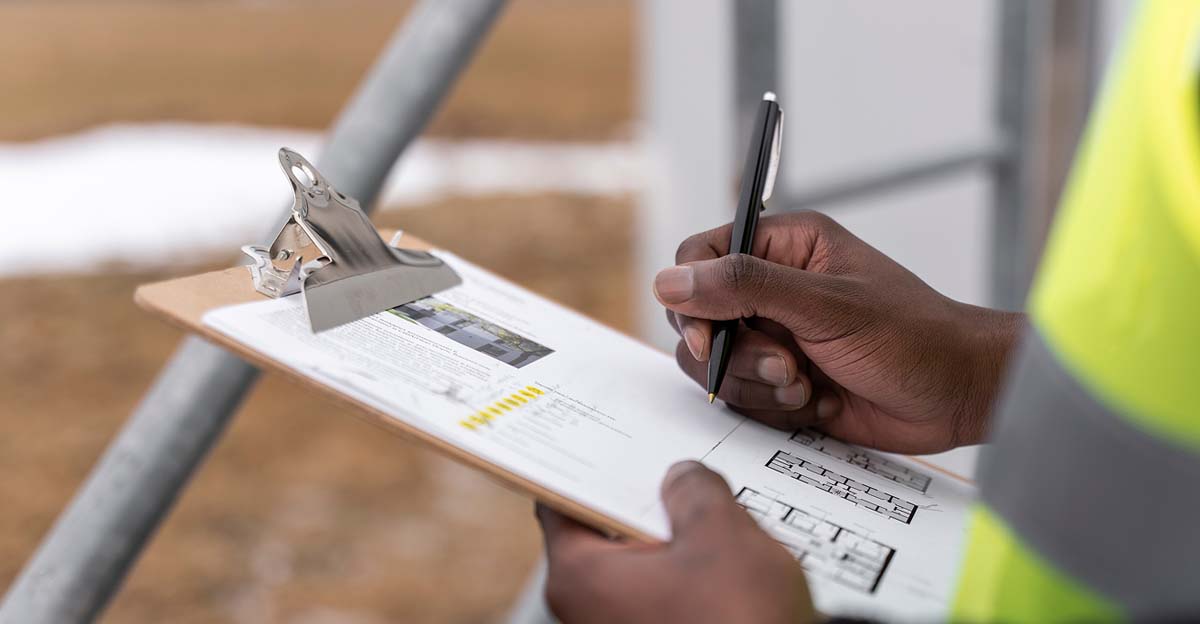
A roof survey is a thorough inspection of your roof’s condition, performed by a qualified professional, to identify any defects, assess structural integrity, and recommend necessary repairs or maintenance.
Unlike a quick visual check you might do yourself, a formal roof survey involves close-up examination - often from on the roof itself or by using a drone - using tools like ladders, scaffolding, moisture metres, and thermal imaging for the most accurate assessment of the roof over your property.
What Are Roof Surveys Important For?
There are many benefits of scheduling a professional roof survey, such as:
- Identifying areas of potential damage, such as cracked or loose tiles.
- Locating areas of heat loss for greater energy efficiency.
- Preserving the value of a property if you’re looking to sell soon.
- Assessing the condition of a property you’ve just bought or are about to buy.
- Monitoring before or after repair works have been completed.
- Reporting suspected or confirmed damage for insurance purposes.
- Demonstrating compliance with insurance regulations.
What Issues Do Roof Surveyors Assess?
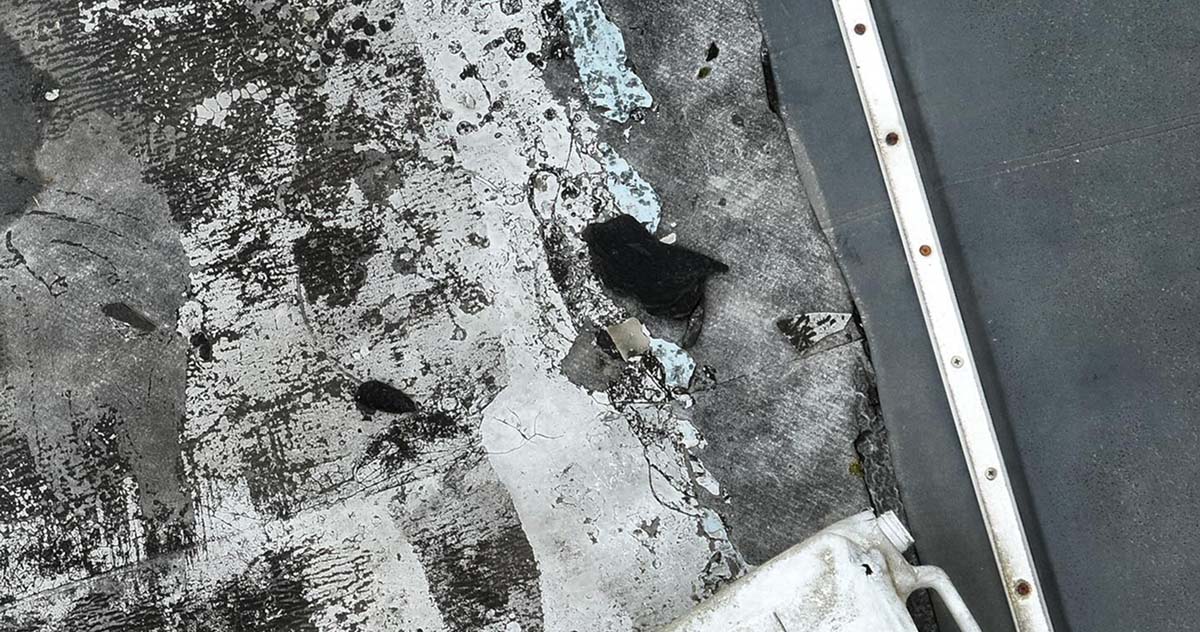
There are many issues which a roof survey can assess for you, including:
- Covering Materials Issues
- Cracked, loose, or missing roof tiles.
- Rust, corrosion, or loose fixings on metal roof sheets.
- Damage to Flashing & Seals
- Splits and corrosion where two roof planes meet.
- Deteriorated lead or sealant, allowing leaks.
- Storm Damage
- Physical deterioration on the roof surface following heavy wind and rain.
- Areas which need urgent attention for occupant safety.
- Roof Structure & Decking Problems
- Rotting or sagging timber rafters and roof trusses.
- Signs of water ingress or warping on deck boards.
- Improper Roof Drainage
- Blocked or split gutters, which have caused them to overflow.
- Areas of pooling water on flat roofs.
- Skylight & Window Problems
- Cracked glass or failed seals.
- Risks of water leaks due to improper installation.
- Insulation & Ventilation Issues
- Blocked vents leading to condensation and mould.
- Issues with loft insulation, including gaps, compression, or air leaks.
- Solar Panel Inefficiencies
- Issues with solar panel installation.
- Areas of shading, hot spots, or bird droppings affecting performance.
- Surface Growth & Debris
- Build-up of moss or algae on the roof surface.
- Build-up of debris, such as branches, holding moisture against the roof surface.
- Safety & Compliance Concerns
- Compliance with building regulations, such as the use of approved materials.
- Compliance with insurance policies that require regular roof surveys.
What Are the Different Types of Roof Surveys?
Roof surveys extend far beyond just a visual inspection; there are many different types which require various levels of roofing expertise. Here are some of the most notable types of roof surveys:
Visual Inspection
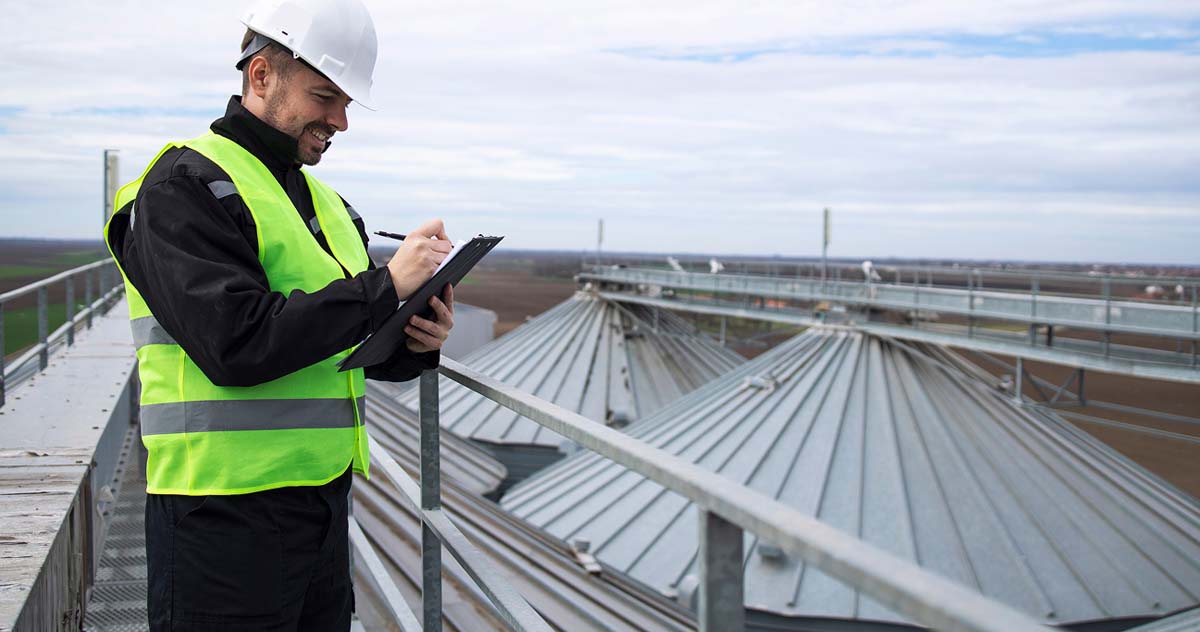
A visual inspection is the foundational roof survey, where a qualified surveyor examines both the exterior surface and the internal loft space to spot visible defects and test suspect areas.
- Use scaffolding to visually inspect check tiles, flashings, and gutters closely.
- Inspects attic for damp, rot, and insulation gaps.
- Physically tests issues such as loose slates and tiles.
- Often serves as the first step before specialist surveys are involved.
Drone Roof Surveys
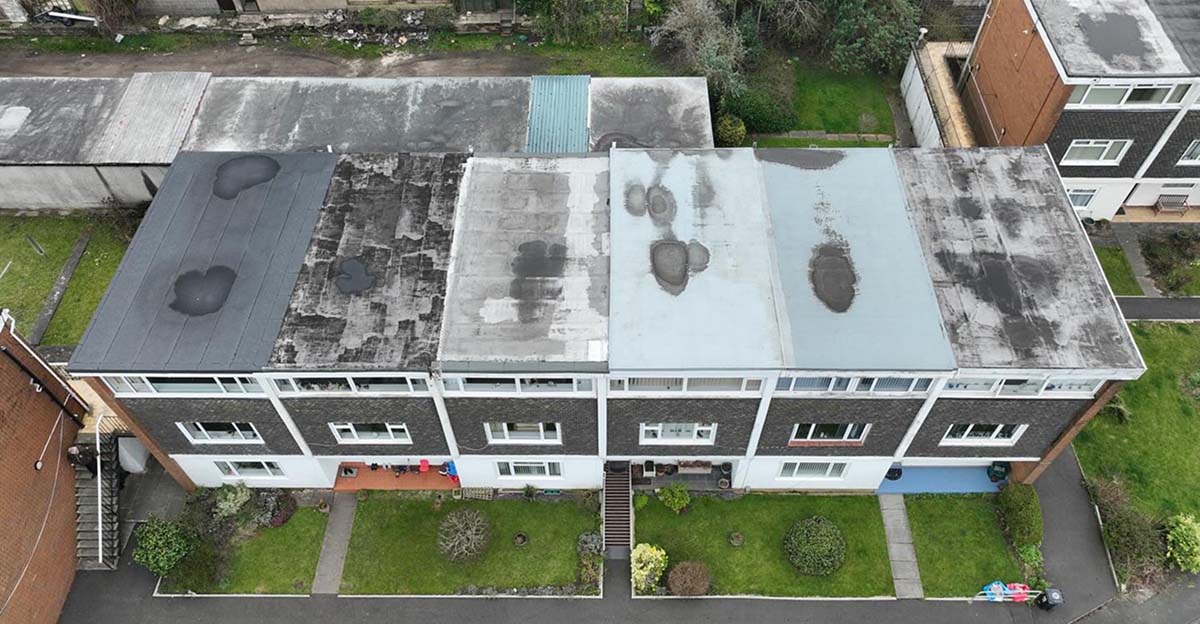
Drone surveys employ UAVs to capture comprehensive, high-resolution imagery of roofs that are large, steep, or hard to access.
- Follows a pre-planned flight path for full coverage of every angle.
- Uses detailed imagery to produce 3D models and detailed orthomosaics.
- Eliminates the need for costly scaffolding and other access requirements.
- Particularly ideal for industrial, multi-unit, and steep-pitch roofs.
Thermographic Surveys
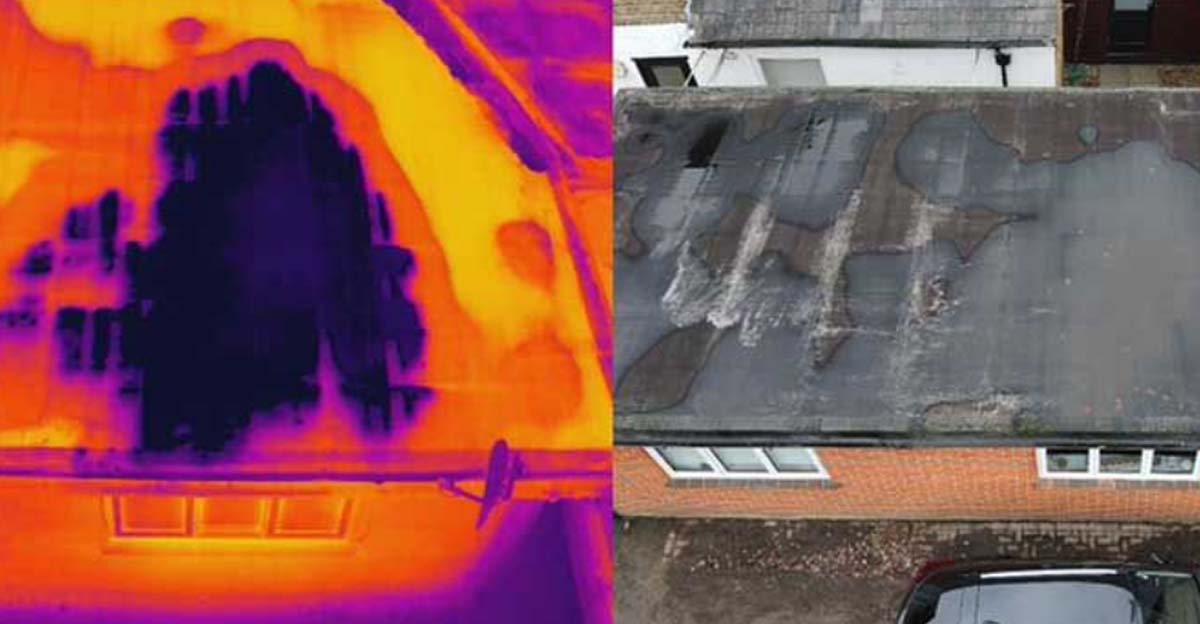
Using infrared cameras, thermographic surveys reveal temperature anomalies that indicate moisture ingress or insulation voids before they become visible to the human eye.
- Conducted from ground level, using drones, or from within an attic.
- Highlights cooler “wet” spots and thermal bridges.
- Detects hidden leaks and damp early, before they become more costly to fix.
- Provides annotated thermal imagery in reports.
Commercial Roof Surveys
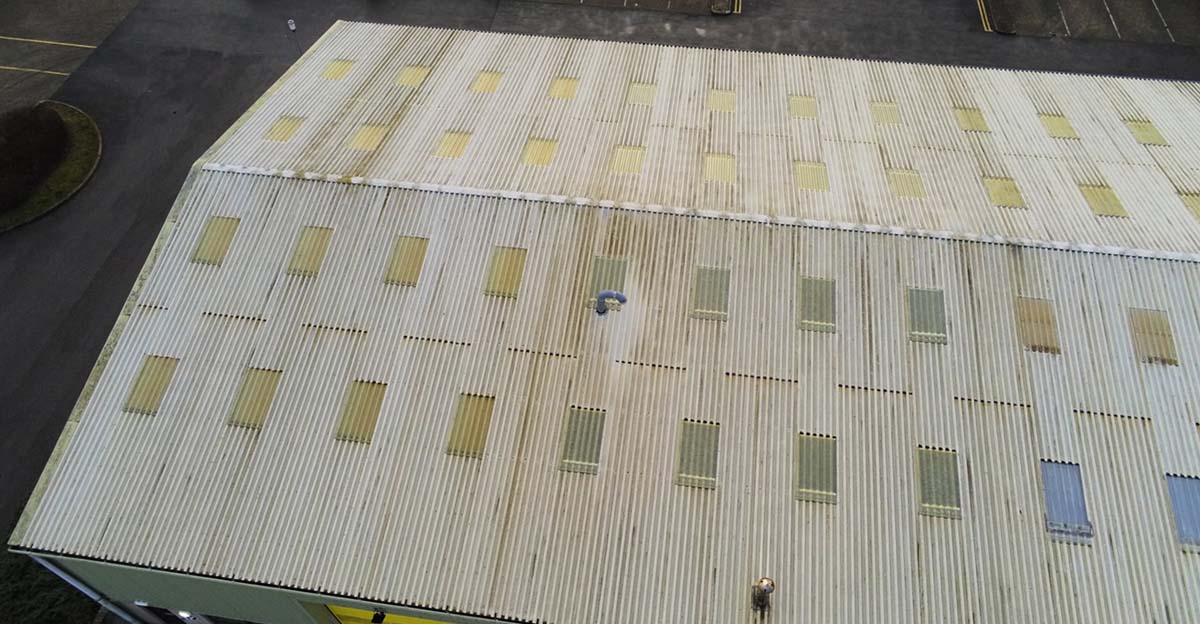
Commercial roof surveys focus on retail, office, and industrial buildings to ensure safety, compliance, and uninterrupted day-to-day operations.
- Assesses membrane integrity, drainage, and rooftop loadings.
- Reviews walkways, guardrails, and health-and-safety features.
- Helps prevent business downtime and meet regulatory requirements.
Solar Panel Inspection Surveys
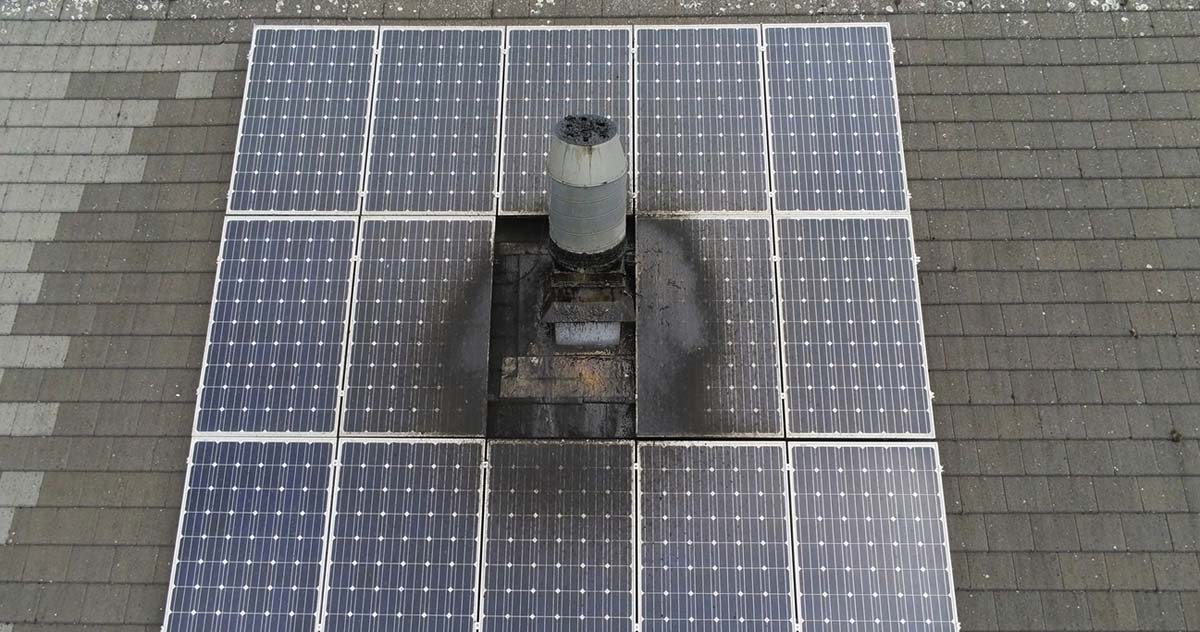
Solar panel surveys ensure both the roof and photovoltaic (PV) modules maximise efficiency and remain free from damage.
- Checks mounting brackets and flashing seals are in good condition.
- Inspects panel frames, glass, and electrical connections.
- Uses infrared thermography to check for hotspots within the panel.
- Protects roofing integrity and renewable-energy performance.
Heritage and Listed Building Roof Surveys
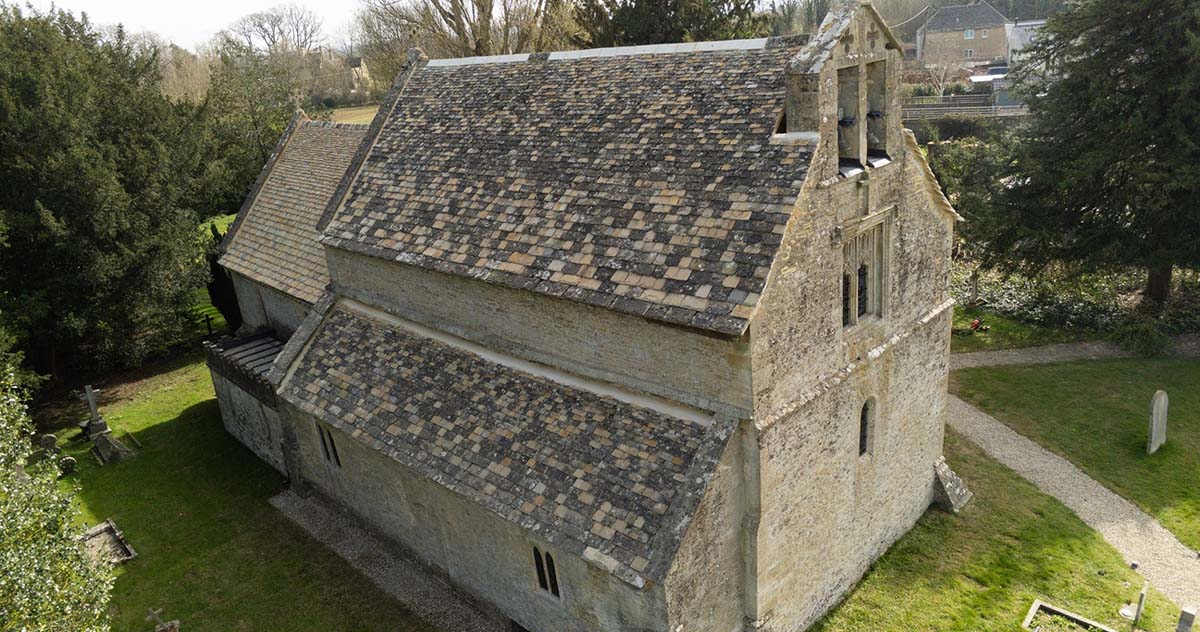
Specialist surveys for historic or listed properties combine conservation needs with non-invasive techniques, helping to preserve the roof covering.
- Records original materials and construction methods.
- Requires necessary permissions from local councils before work.
- Often uses drone imagery to avoid damage to fragile surfaces.
Core Sampling and Roof Build-Up Analysis
Core sampling extracts small roof sections to quantify moisture levels, layer thicknesses, and material composition for the most precise diagnostics.
- Targets suspect areas, like areas of water pooling or blistering.
- Examines roofing membranes, insulation, and decking layers.
- Informs the decision between localised repair and full replacement.
What Happens After a Roof Survey?
Following your roof survey, your surveyor will use all the information captured to create an insightful, actionable report. This will usually include images, detailed notes on findings, and repair recommendations if necessary. For surveys completed using a drone, the images captured can be stitched together to create 2D orthomosaics, 3D models, or digital twins of your property, giving you a more detailed analysis.
View Sample Roof Condition Report
How Much Do Roof Surveys Cost?
The cost of a roof survey largely depends on the type of survey you require. Surveys that use a drone to complete the task are often cheaper, since they are a faster method and don’t need scaffolding or ladders, reducing set-up costs. As a general guide, a visual residential roof survey will often start at £500+, whereas a drone survey for the same type of property may start from £400+.
When Should I Get a Roof Survey?
Most homeowners will benefit from a professional roof survey around once a year. An annual inspection helps catch small issues before they develop into costly leaks or structural damage. Ideally, you should schedule the survey in spring to address damage from winter storms and plan repairs before next winter.
There are a few scenarios where you should schedule more frequent inspections, most notably after any severe weather. Even if no visible damage appears at ground level, a trained surveyor can spot displaced flashings, cracks in slates or tiles, or early signs of membrane fatigue on flat roofs.
More frequent surveys should also be considered for older properties (especially those with more complex roofing materials) or those nearing the end of their original warranty.
Getting a Roof Survey Before Buying a Home
Before you sign on the dotted line, a roof survey should be at the top of your final checklist. A qualified surveyor will thoroughly inspect the roof of your new property so you know exactly what you’re getting into.
Once you’ve received your report on the survey’s findings, you may be able to negotiate seller concessions/contributions or adjust your offer price to account for the repair needs. If the roof is nearing the end of its lifespan, you’ll also be able to budget for a replacement before sudden issues arrive.
How Can You Find a Suitable Roof Surveyor?
For the most accurate, safe, and efficient service, you must choose a qualified surveyor with extensive knowledge about roofs and roof-related issues. You should ask about the different services your surveyor offers, such as whether they can provide thermal imaging, solar panel inspections, or specialist heritage property surveys.
If you’re choosing a drone survey, your drone pilot must hold an Operational Authorisation certificate (formerly a Permission for Commercial Operations (PfCO), a commercial authorisation issued by the Civil Aviation Authority (CAA). This demonstrates that your pilot has the necessary permission to fly the drone for business purposes, although certain areas may need further authorisation.
Schedule Your Next Roof Survey With Full View
A timely roof survey can stop minor issues from turning into costly repairs, protecting both your property’s value and the safety of its occupants. Don’t let small problems get out of control - reach out to our team today to arrange an expert physical or drone roof survey.
Latest Posts
Locations
Full View Limited © 2025.
Unit 2, Bampton Business Centre North, Weald, Bampton
Oxfordshire, OX18 2ET
Company No. 12976689
Website development & design by Beyond Your Brand











